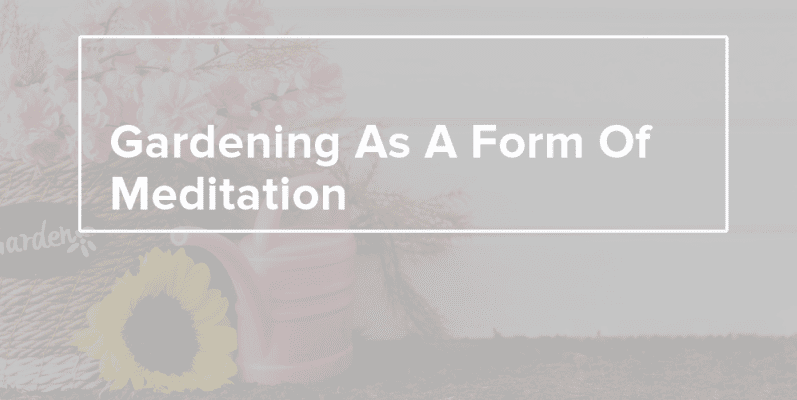A meditation practice can be very hard to establish in a time where we are over stimulated, overtired, and overrun with tasks. Some of us leave little time to even sit down for a meal; how can we afford 5 extra minutes to sit still and think of nothing?
A meditation practice takes patience, dedication, and commitment. But if sitting upright on a pillow with your eyes closed doesn’t float your boat rest assured, there are many other ways to start a meditation or mindfulness practice. You can engage in repetitive activity to calm the mind and reduce stress such as walking, swimming, knitting or woodworking. However, the moment these activities become just something else you need to fit in to your day, you’ll lose all the mental benefits behind them. When at the gym, I personally tend to get caught up in my head. Instead of being present, I tend to get anxious and irritated as my mind starts to wander into what needs to be done and whether I’ll have enough time to fit it in to my day.
During this time of year, there is one particular place that seems to calm my mind a little better than anything or anywhere else. That place is my garden. There’s something different about gardening as opposed to the old gym routine. It has a way of keeping your mind in the present moment. The moment you step outside into nature, there is this sense of calm and maybe even relief. The sounds of modern day life are replaced with the sounds of nature.
Everything is alive. There’s a new whisper in the air, warmth in the breeze, and a vibration all around us.
The process of gardening is just that. It’s a process of life that has been around since the beginning of time. The process starts with sewing a seed and nurturing it to bare fruit for harvest. But it’s even more than that. It tends to demonstrate the interconnectedness of all things. Plants are born from the earth, which is made up of ash, manure, animal matter, and plant compost. Plants live, grow and bare fruit for other creatures to live, reproduce and feed on. Plants also get old and die, becoming part of the earth again providing space for something new to be born. Whether we notice it or not, this continuous cycle of life and rebirth is continuously taking place all around us.
So how can gardening help to grow a meditation practice? Here are a few things to take into account.
1. The garden helps you tune in to your senses.
Just like we tune in to our breath and physical bodies during meditation, being in the garden facilitates the opportunity to tune in to our senses. The smells of the dirt, the fresh air, and even the manure used to fertilize the garden all help to tune the mind to the present moment. The feelings of the sun hitting your back and your hands digging in the dirt, which also happen to provide a natural source of vitamin D along with good bacterial for the immune system. The sights of your plants growing, their colours and foliage. The sounds of the insects buzzing, birds singing, along with all the other life surrounding this innate setting. Then finally the taste of the fruits you’ve nurtured from seeds. When you spend countless hours tending to your plants, you might for the first time in a long time, truly stop to look, feel, and savor their tastes.
2. It can help us realize that no matter where we are in life, we will always be okay.
Like meditation, connecting with nature allows us to tune in to our own feelings. It helps us realize that we are in a constant state of change and adaptation. It allows us to understand that everything is how it should be and that things will be okay in the long run.
3. The garden teaches us that there’s only one for sure in life – that things will always change.
The more time spent in the garden, the more you can appreciate that change is inevitable. By taking the time to notice your natural surroundings, you’ll notice that everything around you is in a constant state of change. Plants must grow, bloom, shed their foliage and die in order to be reborn the following spring. Meditation teaches us to let go of all the things we fear of losing. If we can stay present, we can learn to navigate through the highs and lows of life.
4. It allows us to see that obstacles are just an opportunity to learn and grow.
Nature always adapts to obstacle. Have you ever moved a plant to a new location to see it change more than ever? Perhaps it starts to fill out or lean and grow towards the sun. It might even halt its growth and stops blooming all together in order to preserve energy and persevere in a not so optimal location. Obstacles come into our paths for a reason. The tendency is to go around or hide from them, when really we should face them dead on. If we fear something, it’s usually an indication that we should jump right in to it. This is the only way to learn, grow, adapt and expand.
5. It teaches us patience.
We need to have patience in order to see growth. Nothing is rushed in nature, yet everything is accomplished. Plants don’t go from seedlings to bearing fruit overnight. You can’t snap your fingers and have what you want. It takes energy, consistency and determination to arrive at the fruits of your labor.
6. It helps us see how left unattended, the mind can rule our lives.
Don’t let your negative thoughts rule your mind. Just like a weed left unattended in the garden can multiply and take over, a negative thought has the tendency to dominate our thinking if we allow it to. Take the time to change negative self-talk. Recognize it and then remove it to allow room for bigger dreams to unfold.
7. It gives us something to be grateful for.
A plant will grow, mature and die giving nutrients back to the soil so that another plant has what it needs to sprout. Have gratitude for all that is. There are many ups and downs on life’s path. People will come, touch our lives and then go, leaving us with wisdom and love. Being present and having gratitude even through the hard times in life gives us an appreciation for the good. The more gratitude we have the more positive things come in to our lives that we can be thankful for.
By Erica Matechuk RYT 200



